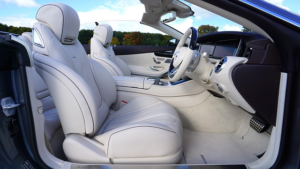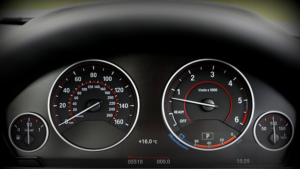The life and death of a private car in the US – Fast Company
For many years now, I have been hearing about the imminent death of private vehicles. But as time goes on, nothing changes. Gen Z and Millennials, who were called the “killers of the old economy,” became the main consumers of goods and services, but car sales did not stop. On the contrary, there is a shortage of new cars in the world, exacerbated by the pandemic.
The sharing model i…….

For many years now, I have been hearing about the imminent death of private vehicles. But as time goes on, nothing changes. Gen Z and Millennials, who were called the “killers of the old economy,” became the main consumers of goods and services, but car sales did not stop. On the contrary, there is a shortage of new cars in the world, exacerbated by the pandemic.
The sharing model is coming, but new generations still need their cars. This is unlikely to change in the foreseeable future—and here’s why.
A CAR IS ESSENTIAL IN THE U.S.
American cities are car-centric. Even without delving into history and geography, we can state that, in the American paradigm, the automobile is king. Everything else is a tool of varying degrees of convenience.
Take Los Angeles, for example. It grows not vertically, but horizontally, expanding over hundreds of square kilometers. A trip from one area to the next can easily turn into 30 to 40 miles. A couple of 2.5-hour trips with transfers will turn even the most inveterate opponent of a private vehicle into a car enthusiast.
What’s more, the U.S. public transport system is going through hard times. And in many states, it is just getting on its feet.
GENERATIONS THAT DIDN’T BRING IT TO AN END
Millennials were once thought of as a generation that would not want to own cars. But it was a matter of time for them to start earning. In 2020, they became the main buyers of new cars with 32% of total sales.
Gen Z is believed to be even more conscious than its predecessor. They were essentially born with a smartphone in their hand and do not know life outside of the digital world. They care about social issues such as the environment and climate change.
Gen Z is not losing interest in cars. More and more young people want to buy a car. In China, this figure reaches 83.7%. In India, 82% of Millennials and Gen Z are thinking about buying a car. This is a global trend, caused, among other things, by the pandemic.
The only thing that changed is the customer journey. Gen Z and Millennials buy cars the same way they buy sneakers and smartphones: online. According to Quantcast, in 2020, visits to used car sales websites by these groups increased by 7.6% (Gen Z) and 1.5% (Millennials).
WHAT THE MATH SAYS
At the time of writing this article, the cheapest downtown LA option I found on Turo, a B2B platform that connects car owners and those who are looking for a car to rent, was a 2009 Chevrolet Suburban for $20 a day. If you’re renting the car for 15 days, that’s $300. Then, you have to add money to get to the car and back, fuel up, and wash it afterward.
Depending on the brand and format of purchase, owning a car will cost a little more. But as soon as we upgrade the class of a rental car or start counting the time we lose every day waiting for a taxi or getting to a car-sharing car, the option of having a personal transport grows incomparably.
CAR SHARING IS AN OPTION, NOT AN ALTERNATIVE
Peer-to-peer (P2P) car sharing has changed the rules of the game in the market and brought flexibility to the industry. This option can be cheaper and more convenient than a taxi in terms of short-term rentals (while traveling, for example).
Also, car sharing can cover an audience that fundamentally refuses to own a private car, perhaps for environmental reasons. P2P car sharing fits perfectly into the sharing economy trend, which ensures the influx of new users. The facts confirm this: The Turo platform is one of the few that ended 2020, the hardest year for the industry, with a profit.
Our holding operates in this market. In 2021, we launched TECHIIA Motorsports, a car rental service, in Los Angeles. There are already more than 150 vehicles in the company’s fleet. According to P&S Intelligence forecasts, over the next eight years, the CAGR of peer-to-peer car sharing will grow by 21.7% per year.
But neither the business nor the virtues of car sharing convince me that it will replace a personal car. After all, a car is not only about getting from point A to point B but also about the reflection of lifestyle and interests. If you are into, say, mountain climbing, you can store ropes and systems in your car, drive to the spot, take out the equipment, climb the tracks, put it back together, and leave. People look at cars as another personal space in their life.
SELF-DRIVING VEHICLES ARE NOT HERE YET
In 2016, Lyft co-founder John Zimmer promised to launch the first self-driving car fleet in Phoenix and San Francisco. His second prediction was even more radical—by 2025, Americans will stop buying private cars in bulk.
Do we have any of this today? Nope. In 2021, global car sales amounted to $66.7 million, which is only 5% less than in the period from 2010 to 2019. This is despite the fact that the global market is still experiencing a shortage of new cars.
In 2022, the car still needs to be controlled by a human driver. The transition to the next levels of autonomy is complicated not only by technical issues. Testing and compliance with local laws take companies a huge amount of time. All of this is accompanied by litigation, lethal accidents, and other issues. Yet another barrier to self-driving cars is the price.
To sum it up, personal cars are here to stay as long as we have the desire and the sense to own and drive them. Some people need it to emphasize their status. Some treat their old Ford Durango as a relic, and Tesla as a work of engineering. Some people just love to drive. In the coming years, especially in the U.S., I believe a private car will remain the best solution for mobility.
Yura Lazebnikov, Managing partner of TECHIIA Holding / Investor in Tech innovative projects
Source: https://www.fastcompany.com/90763007/the-life-and-death-of-a-private-car-in-the-u-s






